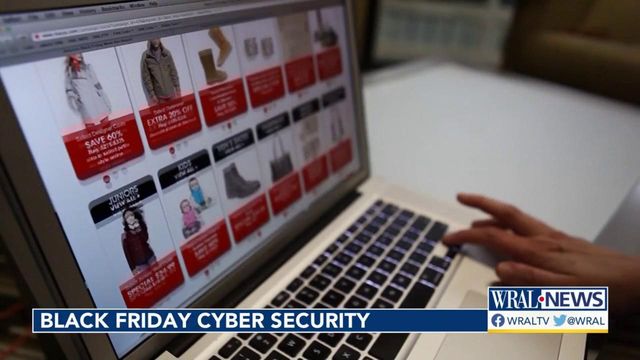'Don't trust anything in your inbox': Holiday is peak season for scammers, hackers
Holiday shopping season is the busiest time of the year for scammers and hackers. Here's how a security expert says you can protect yourself and your family.
Posted — UpdatedAccording to Checkpoint Research, an online security firm, about one in every seven emails this month is a scam, usually attempting to steal information or download malware. And that's expected to continue through December.
Pete Nicoletti is a chief security officer with Checkpoint. He says email scammers have gotten a lot more skilled than they used to be.
"It's no longer easy to spot the frauds," Nicoletti told WRAL News. "Don't trust anything in your inbox."
Online shopper Leigha Harlow says she gets dozen of scam mails and texts a week, especially the ones claiming to be about delivering something you ordered.
Harlow told WRAL News she doesn't fall for them. "I know I didn’t order from them recently, so I know I’m not getting a delivery," she said.
Nicoletti says the scammers are using a social engineering technique known as sense of urgency.
"When they say, 'Oh, we need a little bit more information or a little bit of payment,' wow, I'm going to click on that because I want my shipment," Nicoletti said. "Even though everybody's in a rush, be skeptical when you're getting that email."
If you click that link, he says, you could download a malicious file that can take over your laptop or phone. Most people don’t fall for it, but at the holidays, when people do more online shopping than usual, they’re more vulnerable. And they send millions of these emails, increasing their odds.
"They only need a fraction of us," he said. "They need the grandmothers, the grandfathers, the people that might not be tech-savvy, that might be trusting."
People with concerns about shipping should go directly to the site where you bought the product to check its status, he said. Many offer tracking numbers for packages.
Online shopper Antoinette Wiseman says she mostly sticks to Amazon these days, but she’s gotten scammed in the past by a social media ad.
"It was not successful," Wiseman told WRAL News. "I tried to buy a purse and the purse was not what I expected."
Nicoletti says she’s lucky she even got the purse. He says there are tons of social media scams at holiday time. One scam currently circulating claims to offer an expensive Louis Vuitton purse for $100, but all you’re really buying is trouble.
"It's gonna say, OK, enter your shopping information, and poof: they have your credit card information. They're off to the races, buying things without your permission," he said. "If it sounds too good to be true, it is too good to be true."
Harlow has gotten scammed before, so she’s careful where she clicks.
"I shop on sites that I know are legit, not sites that I have a fear that I'm going to get scammed, because it is hard," she said. "Especially with this economy now, it's very hard."
Nicoletti also strongly recommends using different passwords for different sites. He says more and more big online retailer sites are getting hacked these days, and if shoppers use the same password on multiple sites, they could be compromising their personal information. He says the website "Have I Been Pwned" (haveibeenpwned.com) can help shoppers identify accounts that may have been hacked.
• Credits
Copyright 2024 by Capitol Broadcasting Company. All rights reserved. This material may not be published, broadcast, rewritten or redistributed.






